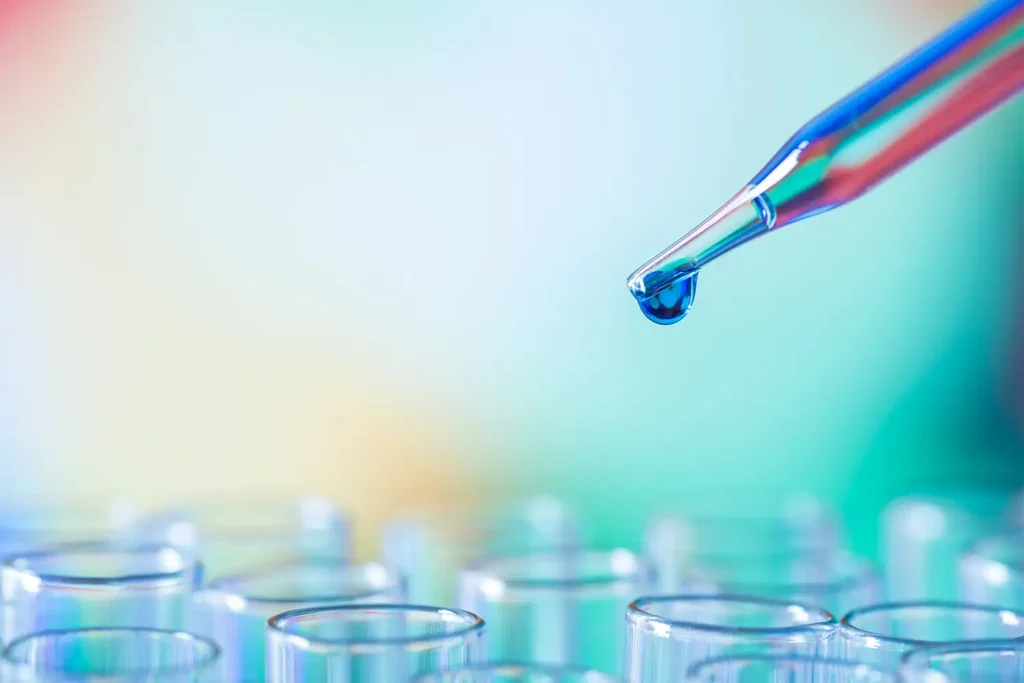Veterinary Testing
FL’s Veterinary analysis refers to testing samples from animals (both livestock and pets) and detecting pathogens, assessing the health of animals, and ensure the safety of food products. It involves various laboratory tests, clinical and diagnostic techniques used to monitor animal health, prevent outbreaks of diseases, and guarantee public health through safe animal-derived products.
Haematology analysis refers to the study and examination of blood, focusing on the cellular components (such as red blood cells, white blood cells, and platelets) and other aspects of blood, such as its volume, composition, and clotting ability. It is a critical part of medical diagnostics and is commonly used to assess overall health, diagnose diseases, monitor treatment efficacy, and detect abnormalities or infections in animals.
- Red Blood Cell (RBC)
- White Blood Cell (WBC)
- Neutrophils
- Lymphocytes
- Haemoglobin
- Monocytes
- Eosinophils
- Basophils
- Platelets
Hormones play crucial roles in regulating the reproductive cycles of animals. Hormone analysis is widely used in managing breeding programs and diagnosing reproductive health issues.
- Progesterone
- Testosterone
- Thyroxine (T4)
- Triiodothyronine (T3)
- More…
Microbiological tests help to identify bacterial, viral, fungal, or parasitic infections.
Bacterial Culture
This test is used to grow and identify specific bacteria from samples like blood, urine, swabs or tissues.
Antibiotic Sensitivity Test
FL uses modern VITEK 2 for Antibiotic Sensitivity Test with MIC value which helps veterinarians prescribe suitable antibiotics to animals for speedy recovery.
PCR (Polymerase Chain Reaction)
A molecular diagnostic test used to detect the DNA or RNA of pathogens (e.g., viruses, bacteria, fungi). This is particularly useful for diagnosing viral infections in small pet animals and large domestic animals.
Antigen or Antibody Testing (ELISA)
Detects specific proteins (antigens) or antibodies that the immune system produces in response to infections.
Rapid tests
Rapid tests in veterinary labs are diagnostic tools designed to detect the presence or absence of a specific disease or condition in animals.
- Brucella Testing
Cytology involves examining cells from tissues, fluids, or masses under microscopic techniques coupled with stains. We offer the below tests.
- Fine Needle Aspiration (FNA)
- Body Fluids
- Urine
Cytology tests are incredibly important in veterinary medicine, offering numerous benefits for animal health: Early Disease Detection, Treatment Guidance, Cancer Screening.
One of the most reliable and widely used methods for avian sex determination is DNA testing, particularly through the analysis of chromosomes. This method can be applied to both sexually dimorphic and non-dimorphic species. The common species of birds are
- Ornamental birds
- Falcons
Veterinary toxicology involves identifying the presence of harmful substances in animals, such as pesticides, heavy metals, or plants.
- Toxin Analysis
- Heavy Metal Toxicity Testing
- Aflatoxin Testing
Histopathology is an indispensable tool in animal laboratory testing, providing critical insights into disease mechanisms, toxicity, and treatment effects.
The key uses of histopathology in veterinary field
- Tumor identification: Diagnoses benign and malignant tumours
- Identifies pathogens
- Degenerative Diseases
- Autoimmune Diseases
- Histopathology slide preparation with H&E stain.
Veterinary parasitology is a vital field that ensures the health and productivity of animals while safeguarding public health. By understanding parasites and their interactions with hosts, veterinarians can develop effective strategies for diagnosis, treatment, and prevention. Fujairah Laboratory provides extensive testing in parasite identification from Blood, Faecal, Skin, etc.
Endoparasites
- Anaplama
- Trypanosoma
- Babesia
- Theileria spp
- Ehrlichia spp
- Toxoplasma gondii
- Giardia
- Coccidia
Ectoparasites
- Lice
- Mites
- Fleas
Helminths
- Nematodes
- Cestodes
- Flukes
Biochemistry lab analysis in veterinary medicine is a critical component of diagnosing and managing diseases in animals. Fujairah Laboratory has a wide range of testing capabilities for various biochemical parameters in blood, urine, and other body fluids.
- Alanine Aminotransferase (ALT)
- Aspartate Aminotransferase (AST)
- Alkaline Phosphatase (ALP)
- Gamma-glutamyl transferase (GGT)
- Bilirubin (Total and Direct)
- Albumin
- Bile Acids
- Blood Urea Nitrogen (BUN)
- Phosphorous:
- Amylase
- Lipase
- Lactate Dehydrogenase (LDH)
- Creatine Kinase (CK)
- Total Protein
- Albumin/Globulin Ratio
- Cholesterol
Comprehensive Testing Solutions for a Safer, Healthier Future.

